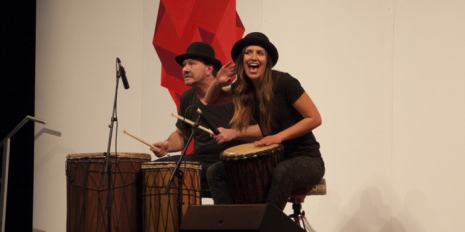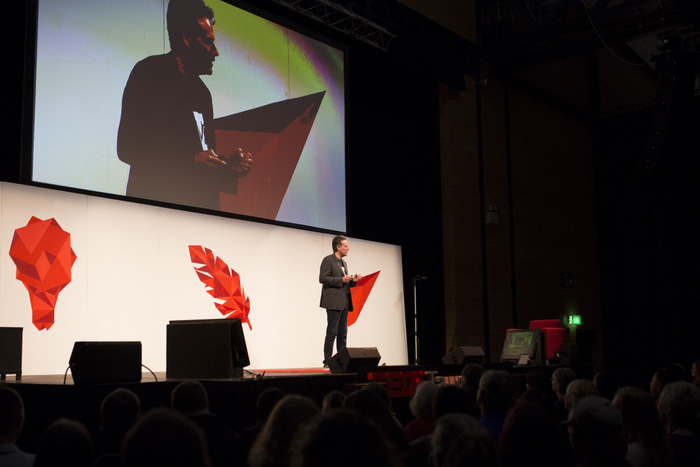
It's always a pleasure to hear about innovators, thinkers and entrepreneurs around the world; people who, in their own way and their own field, are working to make the world a better place. As any of you who have watched a TED video online can attest, it's addictive stuff. It was with quite some anticipation that we attended the Tauranga TEDx conference on Saturday 24 July. So what surprises did it have in store for us?
Well, for starters:
While each speaker and performance was compelling, here are a couple that have kept us talking for days afterwards.

Dr Bronwen Connor: How to Turn Skin Cells into Brain Cells
Ahh research, so dear to our hearts! Especially when the results have such astounding consequences as those Dr. Connor has been working on.
Taking the stage with a real human brain in her hands (don't fret, it was preserved in resin and no audience members were hurt in the making of her presentation) Dr. Connor explained that the human brain contains 100 Billion brain cells, is reliably the most powerful super-computer on earth and is integral to our ability to touch, see, feel, think and express ourselves. Significantly, it's also one of the most difficult organs to treat.
Dr. Connor's inspiration came from 2007, when Dr. Shinya Yamanaka demonstrated that it was possible to re-programme human skin cells to revert to stem cells. While exciting this bereakthrough had some limitations; re-programmed stem cells are powerful but dangerous - their 'pluripotency' means they can become tumors as easily as blood, bone or brain cells.
It was at this point This is when Dr. Connor decided to trust her crazy idea and attempt to directly re-programme skin cells to create brain tissue (without the risk of tumor). And here is where her research has been a stunning success; She has managed to stimulate human skin cells to transform into brain tissue while avoiding the need to become a generic stem cell first.
The beauty of this is that these new brain cells can be used for the accurate (and ethical) testing of new drugs on real human tissue. Shockingly, only 0.1% of drugs developed for treatment of neurological disorders ever make it through trials, in large part due to the inability to test them on anything except lab rats. This breakthrough provides the raw material needed to help increase that hit-rate significantly.
Furthermore, these re-programmed cells could be used for direct therapies for people suffering neural injury or disease - re-introducing the specific type of cell needed by the brain, directly into the area of need.
The need for treatments and research of this nature is significant with 1 in 50 New Zealanders suffering from a neurological disorder or injury. Even anecdotally the impact of these disorders is obvious; by show of hands, almost everyone in the audience has a connection to someone with a disorder of that type.
It was a real thrill to have Dr. Connor give us a window into her research and the astounding outcomes that it is achieving.

Stephen Lethbridge: How to create a workforce that can answer “ungoogleable” questions
It's impossible to escape the fact that today's workforce is filling roles that we didn't know would exist 10 or 20 years ago. The impact of the internet and now the internet of things all demonstrate that if we are to plan for our future, we need to plan for ways to thrive on the unknown.
Stephen Lethbridge, principal of a school on the North Shore of Auckland, is at the forefront of this challenge. His task is to prepare the young minds in his care for a world of dramatic change and 'ungoogleable' questions. He suggests that the traditional, regimented approach to education applies constraints to not only problem solving, but also to problem finding. This conviction resonated strongly with us here at Locus; one of our daily challenges is to find the right problems to solve, not just to assume that the most obvious path is the correct one.
Stephen's approach is to challenge his young wards to learn and grow independently through programmes such as his 'Zombie Robot Club' (but be careful! The first rule of Zombie Robot Club is that you don't talk about Zombie Robot Club). Secret messages, save-the-world challenges and big hoary audacious goals present the children with no clear answer to the question 'so what should I do?'. Instead they are provided with the tools and materials to tinker, experiment and prototype ways of solving the problems presented to them. For Zombie Robot Club, this means light sensors, Arduino boards, electric motors and LED lights. The response from the children is astounding; with the scope to find their own way through the challenges presented to them they unleash their creativity, developing solutions that the creators of the programme themselves couldn't have guessed at.
By extension, the school’s Make Club provides fertile ground for both parents and kids to engage in highly creative problem solving using a similar set of tools. The playful approach fostered in this space gives children and parents alike a chance to learn that failure is not a shortcoming, rather it is a successful step on the path to solving a problem. This has led to wonderful creations such as:
Stephen's challenge is to foster resilience, courage and divergence in his wards. His fresh and exciting approach to preparing our youngest generation for the unknowable challenges they will be confronted with was a reminder to us here at Locus of why we work the way we work. We can't wait to see where him and his students go to next.
TEDx was one of those rare occasions where the entire event resounded strongly with a message of hope - there was a strong sense that clever thinking and hard work deserved to be celebrated loudly. It was a special privilege to hear directly from the brilliant and hard-working kiwi's who are doing such meaningful work in our back yard. If anything, we would really like to hear more from our local innovators more often. So will we be back at TEDx Tauranga again next year? Definitely.
For those of you who like nothing more than hearing from clever Kiwi's and seeing what they've been up to, we strongly recommend getting along to the Young Innovators Forum on Friday 7th August, for a glimpse into what local young minds are working on.
Comments
Great recap Daniel :)
Post new comment